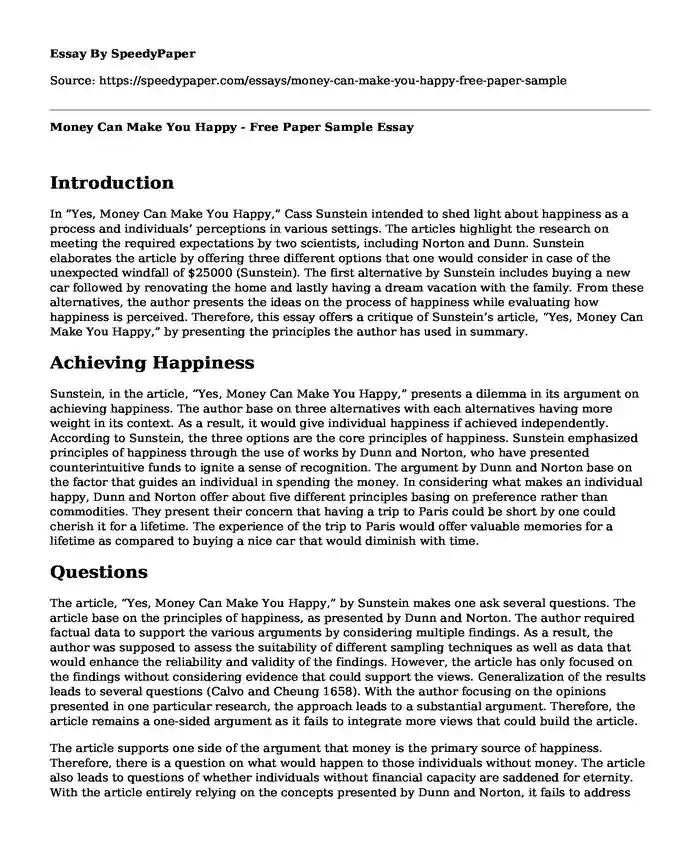
| Type of paper: | Essay |
| Categories: | Happiness Human behavior |
| Pages: | 3 |
| Wordcount: | 666 words |
Introduction
In ”Yes, Money Can Make You Happy,” Cass Sunstein intended to shed light about happiness as a process and individuals’ perceptions in various settings. The articles highlight the research on meeting the required expectations by two scientists, including Norton and Dunn. Sunstein elaborates the article by offering three different options that one would consider in case of the unexpected windfall of $25000 (Sunstein). The first alternative by Sunstein includes buying a new car followed by renovating the home and lastly having a dream vacation with the family. From these alternatives, the author presents the ideas on the process of happiness while evaluating how happiness is perceived. Therefore, this essay offers a critique of Sunstein’s article, “Yes, Money Can Make You Happy,” by presenting the principles the author has used in summary.
Achieving Happiness
Sunstein, in the article, “Yes, Money Can Make You Happy,” presents a dilemma in its argument on achieving happiness. The author base on three alternatives with each alternatives having more weight in its context. As a result, it would give individual happiness if achieved independently. According to Sunstein, the three options are the core principles of happiness. Sunstein emphasized principles of happiness through the use of works by Dunn and Norton, who have presented counterintuitive funds to ignite a sense of recognition. The argument by Dunn and Norton base on the factor that guides an individual in spending the money. In considering what makes an individual happy, Dunn and Norton offer about five different principles basing on preference rather than commodities. They present their concern that having a trip to Paris could be short by one could cherish it for a lifetime. The experience of the trip to Paris would offer valuable memories for a lifetime as compared to buying a nice car that would diminish with time.
Questions
The article, “Yes, Money Can Make You Happy,” by Sunstein makes one ask several questions. The article base on the principles of happiness, as presented by Dunn and Norton. The author required factual data to support the various arguments by considering multiple findings. As a result, the author was supposed to assess the suitability of different sampling techniques as well as data that would enhance the reliability and validity of the findings. However, the article has only focused on the findings without considering evidence that could support the views. Generalization of the results leads to several questions (Calvo and Cheung 1658). With the author focusing on the opinions presented in one particular research, the approach leads to a substantial argument. Therefore, the article remains a one-sided argument as it fails to integrate more views that could build the article.
The article supports one side of the argument that money is the primary source of happiness. Therefore, there is a question on what would happen to those individuals without money. The article also leads to questions of whether individuals without financial capacity are saddened for eternity. With the article entirely relying on the concepts presented by Dunn and Norton, it fails to address the concerns that would make the article convincing.
Conclusion
In conclusion, the article “Yes, Money Can Make You Happy,” by Sunsteins is an interesting argument as it presents what to consider when an individual intends to spend his or her fortune. The article offers principles that guide one to spend, which include spending on something that would thrill an individual in case of spending money. Considering that every individual gas fortune, everyone has to live to their satisfaction and achieve happiness, they live to cherish in life.
Works Cited
Calvo, Rocío, and Felix Cheung. "Does Money Buy Happiness?" Journal of Happiness Studies, vol. 19, no. 6, 2017, pp. 1657-1672.
Sunstein, Cass R. "What You Can Learn from the New Science of Smarter Spending Yes, money can make you happy." The New Republic, 3 Aug. 2013,
http://newrepublic.com/article/114031/money-happiness-and-new-science-smarter-spending. Accessed 15 Sept. 2020.
Cite this page
Money Can Make You Happy - Free Paper Sample. (2023, Nov 26). Retrieved from https://speedypaper.com/essays/money-can-make-you-happy-free-paper-sample
Request Removal
If you are the original author of this essay and no longer wish to have it published on the SpeedyPaper website, please click below to request its removal:
- Free Essay Discussing Marriage Vs Cohabitation
- Psychology Research Proposal Example for Free
- Is It Ever Moral to Break a Promise? Free Essay Example
- The Difference Between Counseling and Psychotherapy. Free Essay
- Free Essay: Is the Gaming World Sexist?
- Essay Sample on Biopsychology: Psychology Meets Biology to Explain Behavior
- Paper Sample on Women and Gender Stereotype Effects
Popular categories




